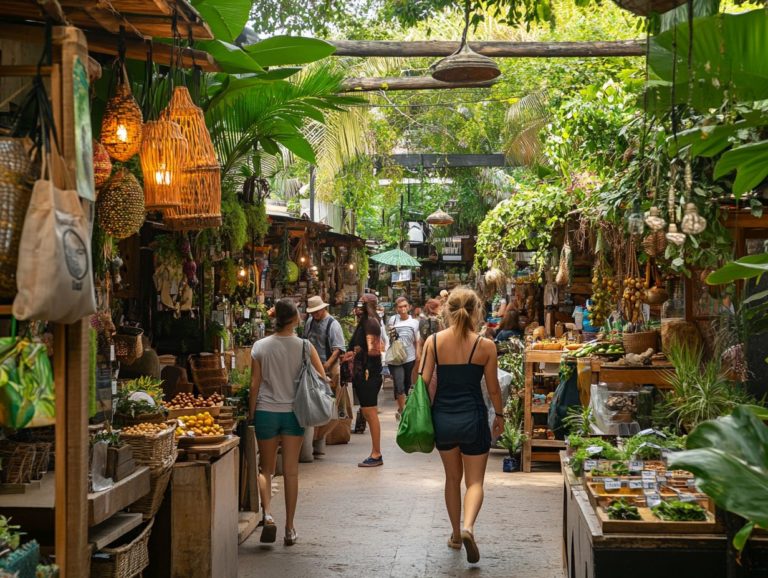How to Reduce Food Waste While Traveling
Traveling opens the door to new cultures and cuisines, but it often comes with an overlooked cost: food waste.
As you savor local delicacies and explore new dining spots, you might unknowingly contribute to a significant environmental and social issue. This exploration delves into the impact of food waste during travel, highlighting its environmental repercussions, social and economic effects, and pinpointing the factors that lead to waste on the go.
You ll also discover practical strategies for minimizing food waste, from savvy planning to selecting sustainable dining options. Plus, learn how to properly dispose of food waste, ensuring you leave a positive mark on the communities you visit.
Join us in transforming your travel experiences into something responsible and rewarding! Let’s make a difference together!
Contents
- Key Takeaways:
- The Impact of Food Waste on Travel
- Causes of Food Waste While Traveling
- Strategies for Reducing Food Waste
- How to Properly Dispose of Food Waste
- Making a Positive Impact While Traveling
- Frequently Asked Questions
- What is food waste and why is it a problem while traveling?
- How can I plan ahead to reduce food waste while traveling?
- What are some tips for minimizing food waste during hotel stays?
- How can I handle leftover food while traveling without wasting it?
- Are there any sustainable dining options to reduce food waste while traveling?
- What are some ways to reduce food waste when exploring nature or camping?
Key Takeaways:

- Food waste during travel impacts the environment and communities. Smart planning can help reduce this.
- Eating local and supporting sustainable practices helps reduce food waste while benefiting the local community.
- Proper food waste disposal, like composting, is crucial for minimizing negative effects when traveling. Supporting local communities and spreading awareness can also help.
The Impact of Food Waste on Travel
Food waste presents a critical challenge in the realm of travel, affecting both the environment and local communities. As a traveler, your decisions about meals, snacks, and accommodations can either worsen or alleviate this pressing issue.
Recently, the tourism industry has increasingly acknowledged the significance of sustainable practices designed to minimize waste and reduce the carbon footprint linked to travel. By embracing eco-friendly habits and supporting local initiatives, you can play a pivotal role in fostering a more sustainable tourism model that champions mindful eating and resource conservation.
Environmental Consequences
The environmental consequences of food waste while traveling are significant, driving up carbon emissions and depleting precious resources. Recent studies indicate that food waste accounts for approximately 8-10% of global greenhouse gas emissions, highlighting the urgent need for you to consider the impact of your choices.
When you discard food, you re not just wasting natural resources; rotting food in landfills produces methane, an incredibly potent greenhouse gas.
You can embrace eco-friendly practices by carrying reusable containers and composting scraps whenever possible. By consciously working to minimize food waste, you can make a substantial difference in the carbon emissions linked to your travels and play a vital role in fostering a healthier planet.
The time to act is now; every meal choice counts.
Social and Economic Effects
Food waste doesn t just take a toll on the environment; it also has profound social and economic implications that ripple through communities, especially in popular tourist destinations. In these lively areas, the stark truth emerges: while some indulge in lavish feasts, countless individuals grapple with hunger and poverty just out of sight.
This paradox underscores how discarded food disproportionately impacts vulnerable populations, worsening the challenges of food insecurity. Organizations like Feeding America and Vacation Donations are vital in addressing this issue. They skillfully redirect surplus food to those in urgent need, not only alleviating hunger but also nurturing a stronger sense of community.
Their work ensures that no plate goes empty while precious resources are preserved.
Causes of Food Waste While Traveling
Understanding the causes of food waste while traveling is essential for crafting effective strategies to tackle this pressing issue. Various factors contribute to food waste in the travel realm, such as the allure of pre-packaged meals, surplus leftovers from restaurants, and inadequate planning regarding snacks and meals.
You may often find yourself in situations where food goes uneaten, leading to waste that could be easily avoided with a bit more mindfulness in your choices.
Factors Contributing to Food Waste

Several factors contribute to food waste during your travels. Common issues include excessive shopping, poor meal planning, and restaurant practices.
You might overestimate your snack needs and buy bulk items that go untouched. Spontaneous dining decisions often lead to ordering more than you can consume, resulting in wasted leftovers.
To tackle this issue, consider these strategies:
- Create a snack inventory before you leave.
- Use shopping apps to track and manage your food supplies.
- Explore shared dining options.
Planning your meals in advance and opting for smaller portions allows you to enjoy your culinary adventures while making a positive impact on the environment.
Strategies for Reducing Food Waste
Implementing effective strategies to reduce food waste while traveling significantly lessens your environmental impact. Thoughtful planning and mindful eating ensure your meals and snacks are fully enjoyed.
Embrace local food options and sustainable practices to minimize your waste footprint. Indulge in the delicious cuisine each destination offers!
Planning Ahead and Making Smart Choices
Planning ahead and making informed choices are key to minimizing food waste on your travels. Think through your meals and snacks before you head out.
Select meals in advance and research local dining options that support sustainability with smaller portion sizes. Explore farmers’ markets, local eateries, or community-supported agriculture programs for fresh, local produce.
Packing reusable containers makes storing leftovers easy. This allows you to savor your meals later instead of discarding them.
Keep a log of the meals and snacks you’ve consumed. This helps you evaluate what worked well, leading to better planning and reduced waste.
Eating Local and Supporting Sustainable Practices
Eating local enhances your travel experience and plays a critical role in reducing food waste. Choosing local eateries allows you to enjoy authentic cuisine while reducing the environmental impact of food transportation.
This choice also supports the local economy and fosters a sense of community. Many restaurants source their ingredients from nearby farmers.
Engage in sustainable tourism practices by exploring local markets or volunteering for environmental initiatives. This way, you can immerse yourself in the culture while supporting efforts that protect the environment.
How to Properly Dispose of Food Waste
Properly disposing of food waste is vital for sustainable travel practices. This helps mitigate environmental harm and supports responsible tourism.
Encouraging composting and recycling of food scraps keeps communities clean. You contribute to a system where resources are reused rather than discarded.
As a traveler, adopt practices that ensure responsible food waste management, minimizing your overall impact on the planet.
Guidelines for Composting and Recycling

Composting and recycling are highly effective methods for managing food waste. You can seamlessly integrate these practices into your travel routine.
By being mindful of your food choices and using the right tools, you can significantly shrink your environmental footprint, even while on the move. Choosing small containers that won’t spill for your food scraps helps keep odors at bay and prevents spills during your travels. Additionally, consider exploring tips on how to reduce plastic use when traveling to make your journey more eco-friendly.
It’s essential to research local composting facilities or community gardens at your destination. Many urban areas offer programs that accept food waste. Familiarizing yourself with local composting guidelines ensures you are practicing sustainability while fully embracing your adventures. For more tips, check out how to stay green while traveling abroad.
Making a Positive Impact While Traveling
Making a positive impact while traveling is thrilling and crucial for the sustainability of the places you explore. By actively supporting local communities and businesses, you contribute to economic growth and minimize your waste footprint.
Raising awareness about food waste and educating those around you can spark a movement toward more responsible and eco-friendly travel practices.
Supporting Local Communities and Businesses
Supporting local communities and businesses offers a remarkable opportunity to make a meaningful impact on both the economy and the environment.
When you choose local accommodations, like family-run guesthouses or eco-friendly lodges, you immerse yourself in a more authentic experience while playing a significant role in bolstering the local economy.
Dining at neighborhood restaurants instead of international chains allows you to enjoy traditional dishes while ensuring that your dollars directly support local chefs and farmers.
Shopping at local markets for fresh produce and handmade goods reduces food waste since these vendors typically offer items that are in season and sourced nearby. By making these choices, you embrace a sustainable lifestyle that fosters community growth and nurtures the unique culture of your destinations.
Spreading Awareness and Educating Others
Spreading awareness and educating others about food waste issues is a vital role you can embrace as a traveler, championing sustainable practices along the way.
Engaging in meaningful conversations with locals helps you immerse yourself in regional food customs and challenges while sharing knowledge about the impact of food waste. Encouraging discussions at local markets or community events truly highlights the importance of sustainability.
Sharing your perspective and experiences on social media platforms can spark interest and inspire others to reconsider their food habits. Collaborating with local sustainability organizations offers a unique chance to actively participate in community initiatives, helping to foster lasting change and deepen your understanding of the environmental challenges faced by different cultures.
Frequently Asked Questions
What is food waste and why is it a problem while traveling?

Food waste refers to discarding edible food, whether in households, restaurants, or during travel. This contributes to environmental issues like greenhouse gas emissions and resource loss.
How can I plan ahead to reduce food waste while traveling?
One simple way to reduce food waste while traveling is to plan your meals and snacks in advance. This helps you avoid buying too much food or food that you won’t end up eating.
What are some tips for minimizing food waste during hotel stays?
When staying at a hotel, opt out of daily room cleaning and towel changes to reduce water and energy waste. You can also ask for smaller portions of food or share meals with others to avoid leaving leftovers that may go to waste.
How can I handle leftover food while traveling without wasting it?
If you have leftover food while traveling, find ways to use it in your next meal. Request a to-go container at restaurants to take your leftovers home.
Are there any sustainable dining options to reduce food waste while traveling?
Research and support local farmers’ markets and sustainable restaurants. Choose places that offer composting or food donation programs.
What are some ways to reduce food waste when exploring nature or camping?
When camping, use reusable containers and utensils instead of single-use items. Plan meals with ingredients that last longer and dispose of food scraps properly to avoid attracting animals.






